人教新目标九年级英语Unit13知识点复习(Word版)
- 格式:docx
- 大小:22.67 KB
- 文档页数:4
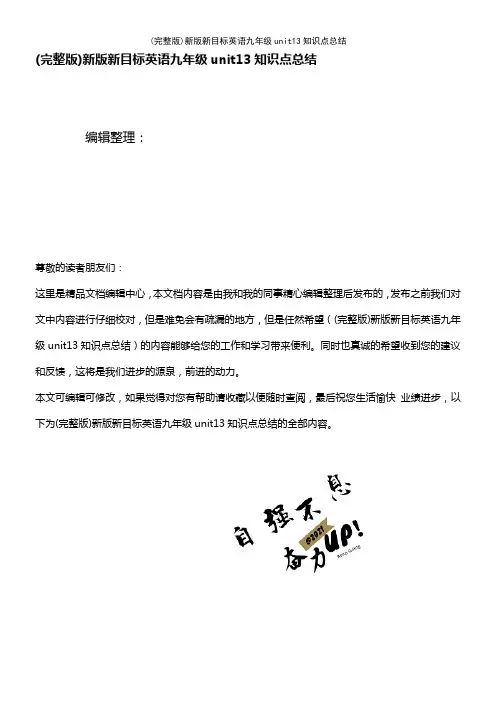
(完整版)新版新目标英语九年级unit13知识点总结编辑整理:尊敬的读者朋友们:这里是精品文档编辑中心,本文档内容是由我和我的同事精心编辑整理后发布的,发布之前我们对文中内容进行仔细校对,但是难免会有疏漏的地方,但是任然希望((完整版)新版新目标英语九年级unit13知识点总结)的内容能够给您的工作和学习带来便利。
同时也真诚的希望收到您的建议和反馈,这将是我们进步的源泉,前进的动力。
本文可编辑可修改,如果觉得对您有帮助请收藏以便随时查阅,最后祝您生活愉快业绩进步,以下为(完整版)新版新目标英语九年级unit13知识点总结的全部内容。
(完整版)新版新目标英语九年级unit13知识点总结编辑整理:张嬗雒老师尊敬的读者朋友们:这里是精品文档编辑中心,本文档内容是由我和我的同事精心编辑整理后发布到文库,发布之前我们对文中内容进行仔细校对,但是难免会有疏漏的地方,但是我们任然希望 (完整版)新版新目标英语九年级unit13知识点总结这篇文档能够给您的工作和学习带来便利.同时我们也真诚的希望收到您的建议和反馈到下面的留言区,这将是我们进步的源泉,前进的动力.本文可编辑可修改,如果觉得对您有帮助请下载收藏以便随时查阅,最后祝您生活愉快业绩进步,以下为 <(完整版)新版新目标英语九年级unit13知识点总结〉这篇文档的全部内容。
Unit13 We're trying to save the earth!Section A1。
try to do =try one’s best to do 努力去做某事Every student should try to study hard in order to study in a university。
为了进入大学学习,每个学生都应该努力学习。
2. be related to 与…有关I am not related to him in any way。
我和他无任何关系。

人教新目标版英语九年级全册Unit 13重点短语和句型Section Awrite to ... 给……写信the bottom of the river 河底throw litter into the river 往河里扔垃圾clean up ... 把……打扫干净land / air / noise / water / waste pollution土地 / 空气 / 噪音 / 水 / 垃圾污染turn ... into ... 把……变成……cut down air pollution 减少空气污染instead of 代替be good for ... 对……有好处takeaway food 外卖食品keep public places clean and beautiful 保持公共场所干净美观make a difference 影响;有作用lead to 带来;导致hear of 听说a bowl of shark fin soup 一碗鱼翅羹cut off 切掉be harmful to ... 对……有害no longer 不再at the top of ... 在……顶部或顶端the food chain 食物链environmental protection group 环境保护组织develop laws 制定法律so far 到目前为止scientific studies 科学研究take part in 参加help out 帮助摆脱(困境)take action 采取行动begin with ... 以……开始save electricity 省电turn off the lights / shower 关灯 / 淋浴器pay for 付费;付出代价add up 加起来use public transportation 使用公共交通工具Section Bstop doing sth. 停止做某事ride in cars 乘小汽车paper napkins 餐巾纸throw away 扔掉;抛弃put sth. to good use 好好利用某物have a creative mind 拥有创意的头脑build ... out of ... 用……建造……pull ... down 拆下;摧毁upside down 上下颠倒;倒转in front of ... 在……前面win a prize 获奖open a small shop 开一家小店set up a website 建网站sell ... online 在网上出售……use ... to do sth. 用……做某事set up a small business 经营小生意be known for doing sth. 因做某事而闻名look like 看起来像the importance of environmental protection环境保护的重要性bring back 恢复;使想起;归还。
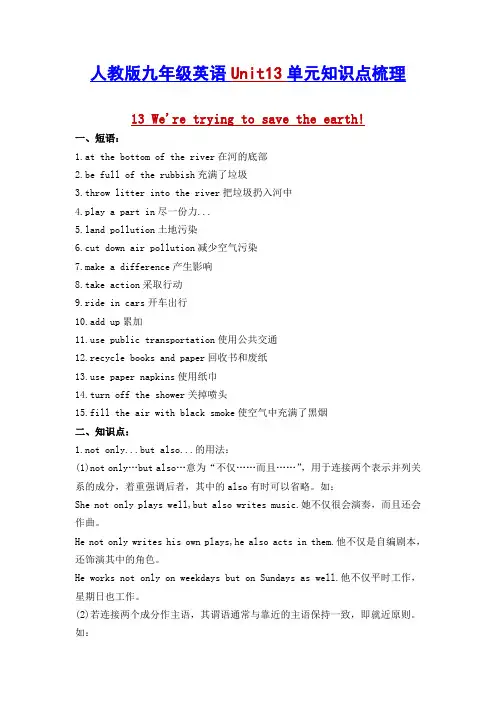
一、短语:1.at the bottom of the river在河的底部2.be full of the rubbish充满了垃圾3.throw litter into the river把垃圾扔入河中4.play a part in尽一份力...nd pollution土地污染6.cut down air pollution减少空气污染7.make a difference产生影响8.take action采取行动9.ride in cars开车出行10.add up累加e public transportation使用公共交通12.recycle books and paper回收书和废纸e paper napkins使用纸巾14.turn off the shower关掉喷头15.fill the air with black smoke使空气中充满了黑烟二、知识点:1.not only...but also...的用法:(1)not only…but also…意为“不仅……而且……”,用于连接两个表示并列关系的成分,着重强调后者,其中的also有时可以省略。
如:She not only plays well,but also writes music.她不仅很会演奏,而且还会作曲。
He not only writes his own plays,he also acts in them.他不仅是自编剧本,还饰演其中的角色。
He works not only on weekdays but on Sundays as well.他不仅平时工作,星期日也工作。
(2)若连接两个成分作主语,其谓语通常与靠近的主语保持一致,即就近原则。
如:Not only you but also he has to leave.不只是你,他也得离开。
(3)若连接两个句子,not only后面的句子要用倒装,如:Not only did he speak more correctly,but he spoke more easily.他不仅说得更正确,而且讲得更不费劲了。
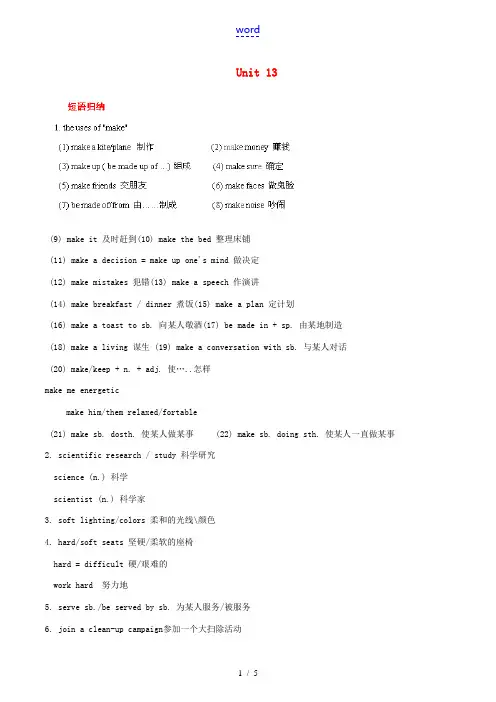
Unit 13(9) make it 及时赶到(10) make the bed 整理床铺(11) make a decision = make up one's mind 做决定(12) make mistakes 犯错(13) make a speech 作演讲(14) make breakfast / dinner 煮饭(15) make a plan 定计划(16) make a toast to sb. 向某人敬酒(17) be made in + sp. 由某地制造(18) make a living 谋生 (19) make a conversation with sb. 与某人对话(20) make/keep + n. + adj. 使…..怎样make me energeticmake him/them relaxed/fortable(21) make sb. dosth. 使某人做某事 (22) make sb. doing sth. 使某人一直做某事2. scientific research / study 科学研究science (n.) 科学scientist (n.) 科学家3. soft lighting/colors 柔和的光线\颜色4. hard/soft seats 坚硬/柔软的座椅hard = difficult 硬/艰难的work hard 努力地5. serve sb./be served by sb. 为某人服务/被服务6. join a clean-up campaign参加一个大扫除活动president campaign 总统竞选7. endangered animals 濒危动物8. look mysterious 看起来神秘mystery (n.) 神秘9. have shiny hair 有着一头光亮的头发10. have silky skin 有如丝般的肌肤11. lookout sunglasses 太阳镜12. beauty cream 香皂13. make sb. confused 使某人困惑Some ads are confusing and misleading.一些广告使人困惑并且误导。
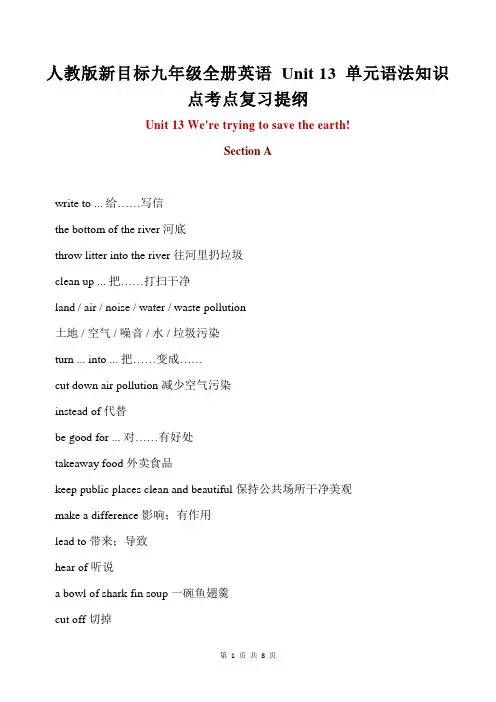
人教版新目标九年级全册英语Unit 13 单元语法知识点考点复习提纲Unit 13 We're trying to save the earth!Section Awrite to ... 给……写信the bottom of the river 河底throw litter into the river 往河里扔垃圾clean up ... 把……打扫干净land / air / noise / water / waste pollution土地 / 空气 / 噪音 / 水 / 垃圾污染turn ... into ... 把……变成……cut down air pollution 减少空气污染instead of 代替be good for ... 对……有好处takeaway food 外卖食品keep public places clean and beautiful 保持公共场所干净美观make a difference 影响;有作用lead to 带来;导致hear of 听说a bowl of shark fin soup 一碗鱼翅羹cut off 切掉be harmful to ... 对……有害no longer 不再at the top of ... 在……顶部或顶端the food chain 食物链environmental protection group 环境保护组织develop laws 制定法律so far 到目前为止scientific studies 科学研究take part in 参加help out 帮助摆脱(困境)take action 采取行动begin with ... 以……开始save electricity 省电turn off the lights / shower 关灯 / 淋浴器pay for 付费;付出代价add up 加起来use public transportation 使用公共交通工具Section Bstop doing sth. 停止做某事ride in cars 乘小汽车paper napkins 餐巾纸throw away 扔掉;抛弃put sth. to good use 好好利用某物have a creative mind 拥有创意的头脑build ... out of ... 用……建造……pull ... down 拆下;摧毁upside down 上下颠倒;倒转in front of ... 在……前面win a prize 获奖open a small shop 开一家小店set up a website 建网站sell ... online 在网上出售……use ... to do sth. 用……做某事set up a small business 经营小生意be known for doing sth. 因做某事而闻名look like 看起来像the importance of environmental protection环境保护的重要性bring back 恢复;使想起;归还【重点句型】1. Even the bottom of the river was full of rubbish. 甚至河底都充满垃圾。

人教版新目标九年级全册英语Unit 13 单元语法知识点考点复习提纲Unit 13 We're trying to save the earth!Section Awrite to ... 给……写信the bottom of the river 河底throw litter into the river 往河里扔垃圾clean up ... 把……打扫干净land / air / noise / water / waste pollution土地 / 空气 / 噪音 / 水 / 垃圾污染turn ... into ... 把……变成……cut down air pollution 减少空气污染instead of 代替be good for ... 对……有好处takeaway food 外卖食品keep public places clean and beautiful 保持公共场所干净美观make a difference 影响;有作用lead to 带来;导致hear of 听说a bowl of shark fin soup 一碗鱼翅羹cut off 切掉be harmful to ... 对……有害no longer 不再at the top of ... 在……顶部或顶端the food chain 食物链environmental protection group 环境保护组织develop laws 制定法律so far 到目前为止scientific studies 科学研究take part in 参加help out 帮助摆脱(困境)take action 采取行动begin with ... 以……开始save electricity 省电turn off the lights / shower 关灯 / 淋浴器pay for 付费;付出代价add up 加起来use public transportation 使用公共交通工具Section Bstop doing sth. 停止做某事ride in cars 乘小汽车paper napkins 餐巾纸throw away 扔掉;抛弃put sth. to good use 好好利用某物have a creative mind 拥有创意的头脑build ... out of ... 用……建造……pull ... down 拆下;摧毁upside down 上下颠倒;倒转in front of ... 在……前面win a prize 获奖open a small shop 开一家小店set up a website 建网站sell ... online 在网上出售……use ... to do sth. 用……做某事set up a small business 经营小生意be known for doing sth. 因做某事而闻名look like 看起来像the importance of environmental protection环境保护的重要性bring back 恢复;使想起;归还【重点句型】1. Even the bottom of the river was full of rubbish. 甚至河底都充满垃圾。
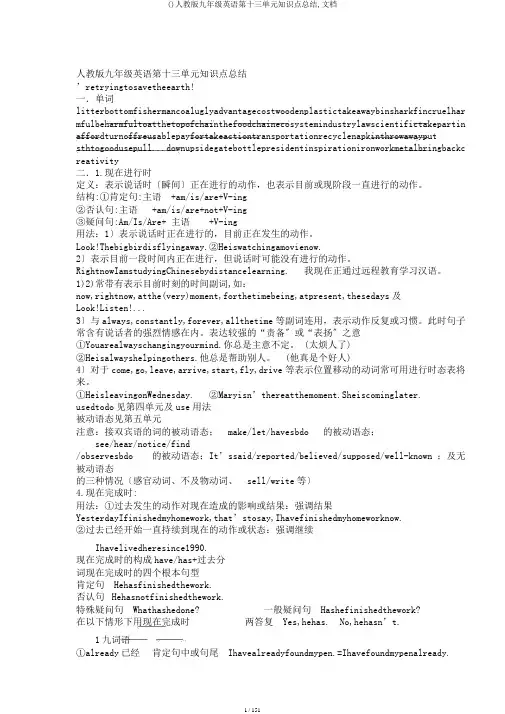
人教版九年级英语第十三单元知识点总结’retryingtosavetheearth!一.单词litterbottomfishermancoaluglyadvantagecostwoodenplastictakeawaybinsharkfincruelhar mfulbeharmfultoatthetopofchainthefoodchainecosystemindustrylawscientifictakepartin affordturnoffreusablepayfortakeactiontransportationrecyclenapkinthrowawayput sthtogoodusepull...downupsidegatebottlepresidentinspirationironworkmetalbringbackc reativity二.1.现在进行时定义:表示说话时〔瞬间〕正在进行的动作,也表示目前或现阶段一直进行的动作。
结构:①肯定句:主语+am/is/are+V-ing②否认句:主语+am/is/are+not+V-ing③疑问句:Am/Is/Are+ 主语+V-ing用法:1〕表示说话时正在进行的,目前正在发生的动作。
Look!Thebigbirdisflyingaway.②Heis watchingamovienow.2〕表示目前一段时间内正在进行,但说话时可能没有进行的动作。
RightnowIamstudyingChinesebydistancelearning. 我现在正通过远程教育学习汉语。
1)2)常带有表示目前时刻的时间副词,如:now,rightnow,atthe(very)moment,forthetimebeing,atpresent,thesedays及Look!Listen!...3〕与always,constantly,forever,allthetime等副词连用,表示动作反复或习惯。
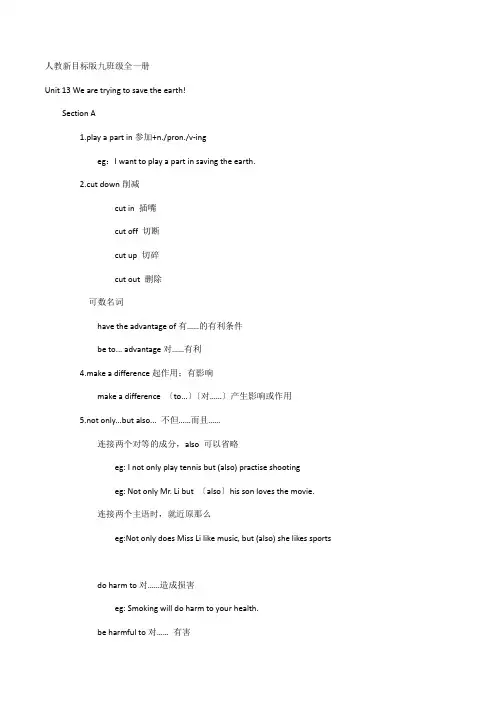
人教新目标版九班级全一册Unit 13 We are trying to save the earth!Section A1.play a part in参加+n./pron./vingeg:I want to play a part in saving the earth.2.cut down削减cut in 插嘴cut off 切断cut up 切碎cut out 删除可数名词have the advantage of有……的有利条件be to... advantage对……有利4.make a difference起作用;有影响make a difference 〔to...〕〔对……〕产生影响或作用5.not only...but also... 不但……而且……连接两个对等的成分,also 可以省略eg: I not only play tennis but (also) practise shootingeg: Not only Mr. Li but 〔also〕his son loves the movie.连接两个主语时,就近原那么eg:Not only does Miss Li like music, but (also) she likes sportsdo harm to对……造成损害eg: Smoking will do harm to your health.be harmful to对…… 有害eg: Don't read in the sun. It is harmful to your eyes7.the number of……的数量eg:The number of girls in our class is 30辨析a number of很多接可数名词复数谓语动词用复数形式the number of……的数量接可数名词复数谓语动词用单三形式8.be against...反对反:be for...支持……eg: I am not against your idea. Instead, I'm for you根本结构be+ 动词的过去分词eg: The glass is broken主动语态We visited that factory last summer.被动语态That factory was visited by us last summer.感官动词/使役动词变为被动语态时带to主动: I often hear Mary sing in the next room被动:Mary is often heard to sing in the next roomSection Beg: We recycle all of our plastic bags.2.throw away扔掉;抛弃eg: You can throw them away if you don't want these clothes.3.pull...down拆下;摧毁put短语pull together齐心协力pull off 脱去pull out拔出pull in(车等)停下,进站4.win a prize赢得奖品win赢,获胜后接竞赛、活动、奖品beat击败;战胜后接人或团队等竞争对手5.set up建立set off/out动身,动身set free释放set down写下,登记6.bring back恢复;归还;带回eg: Please bring back the books to the library.制造者,制造v. create制造adj. Creative 制造性的1. Could you give me some advice on how to lose weight?Well, I think eating healthily can really make_____________difference.A. anB. aC. theD. /2. I'm surprised to see you smoking. You ___________, I remember.A. aren’t used toB. weren’t used toC. didn’t use toD. don’t use to3. So far this year we __________ about half of the road and we are sure that it will be finished on time.A. have builtB. builtC. buildD. are building4. It’s helpful for older adults to exercise, not only_________ them keep their bodies healthily, but it can also helptheir brains.A. it helpsB. helps itC. can it helpD. it can help5. This is really____________ ugly bird,but it is_______useful bird, it can help fisherman catch fish.A. an;aB. an;anC. a;aD. a;an6. There __________ lots of trees in the area.but they have all gone because people built a railway here.A. have beenB. used to beC. have hadD. used to have7. In the past, my grandpa cut ___________trees and cut them ___________for firewoodA. down;upB. up;downC. out;upD. down;off8. The painting on display was _________ by a very famous artist in China.A. createB. createsC. createdD. creating9. The geography teacher told us that the sun __________ in the east.A. had risenB. has risenC. roseD. rises10. In our school library there _______ a number of books and the number of them _________ growing larger and larger.A. is;areB. has;isC. are;isD. have;are11. If all of us pull together, there must be something we can do _________________.A. improve the environmentB. improved the environmentC. improving the environmentD. to improve the environment12. __________ my backpack, but I also lost my way yesterday.A. Not only lost IB. Not only did I loseC. Not only I lostD. Not only I have lostIII. Filling in the blanks below with the correct forms of the given words in the brackets.1. Has he_________(tell) you about what happened on that day?2. If we keep putting waste water into the ocean, sooner or later the ecosystem in the ocean will be __________(destroy).3. The numbers of some kinds of fishes__________( have) reduced since the last century.4. Wild Aid and the WWF are two__________( environment) protection groups around the world.5. Traffic fumes are__________( harm) to the environment.6. Fresh air makes a big______________(different) to our health.7. The girl used to _______________(take) a bus to school, but this morning she walked.8. Everyone should play a role in_______________ (protect) the forest.9. Please remember to _______________(bring) a cloth bag when you go shopping in the supermarket.10. What are your _______________(suggest) for solving the problems?11. _______________ (fish)are allowed to catch fish only in the open season.12. China has rich natural resources, such as___________(coal) and iron.13. A smile, ___________(cost) nothing, but it gives so much to people around you.14. Travelers should throw the rubbish into the _______________(bin) along the pathway in the mountain.15. What’s the _______________(weigh) of the wooden box?16. Don't make so much noise. The children ____________(have) an English lesson right now.17. She used to________(read) English in the morning but now she's used to reading in the evening.18. Every year millions of trees ____________(plant) to make our country more beautiful.19. In the past few years we ____________(learn)about 3000 English words.20. There is such a big noise that I can't ____________(hear) you very well.21. I stopped ____________(use) disposable chopsticks(一次性筷子) last year.22. While I ____________(do)my homework, the phone rang.23. Seeing the tears in her eyes, he quickly took out a piece of ___________ (napkins).24. Have you ever collected waste paper or bottles for____________( recycle)?25. It usually____________(take) me a few minutes to wash my hair.26. Father____________(use) to go to work by car, but now he takes the bus.27. Let's go hiking instead of ____________( stay) at home, shall we?IV. Translation.1. 杰森今日早上乘坐公共汽车上班而不是步行。
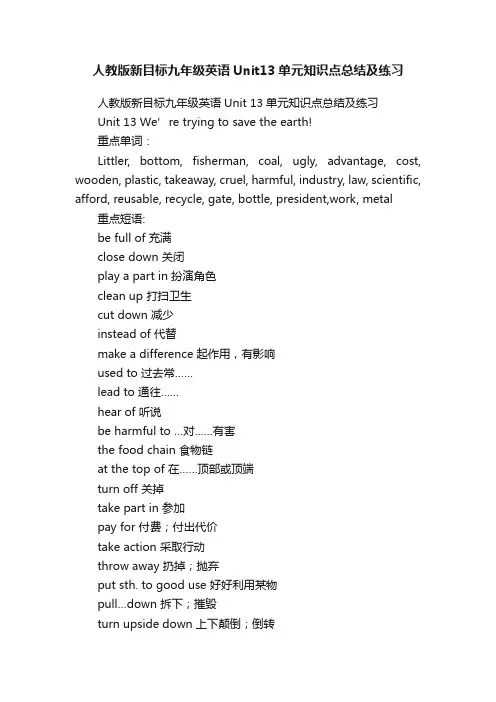
人教版新目标九年级英语Unit13单元知识点总结及练习人教版新目标九年级英语Unit 13单元知识点总结及练习Unit 13 We’re trying to save the earth!重点单词:Littler, bottom, fisherman, coal, ugly, advantage, cost, wooden, plastic, takeaway, cruel, harmful, industry, law, scientific, afford, reusable, recycle, gate, bottle, president,work, metal 重点短语:be full of 充满close down 关闭play a part in 扮演角色clean up 打扫卫生cut down 减少instead of 代替make a difference 起作用,有影响used to 过去常……lead to 通往……hear of 听说be harmful to …对……有害the food chain 食物链at the top of 在……顶部或顶端turn off 关掉take part in 参加pay for 付费;付出代价take action 采取行动throw away 扔掉;抛弃put sth. to good use 好好利用某物pull…down 拆下;摧毁turn upside down 上下颠倒;倒转set up 建起,成立bring sb. Back to 使想起be known for 因……而闻名重点句式:1.It used to be so clean.它过去是那么干净。
2.Everyone in this town should play a part in cleaning it up.我们镇上的每个人都应该尽一份力把这条河清理干净。
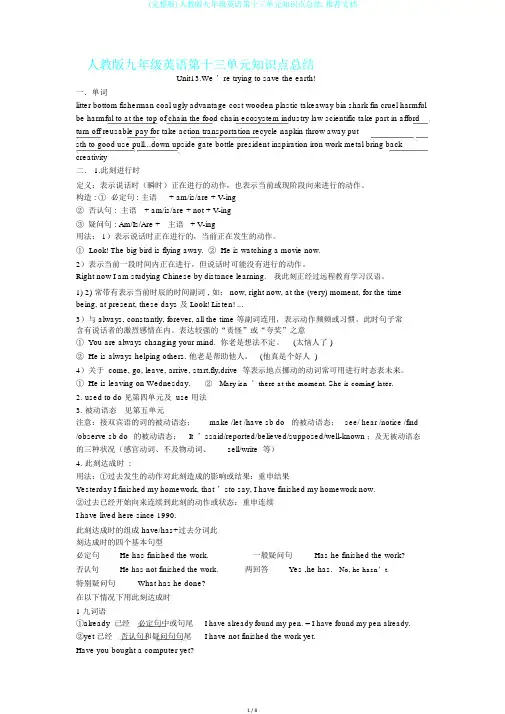
人教版九年级英语第十三单元知识点总结Unit13.We ’re trying to save the earth!一.单词litter bottom fisherman coal ugly advantage cost wooden plastic takeaway bin shark fin cruel harmful be harmful to at the top of chain the food chain ecosystem industry law scientific take part in afford turn off reusable pay for take action transportation recycle napkin throw away putsth to good use pull...down upside gate bottle president inspiration iron work metal bring back creativity二. 1.此刻进行时定义:表示说话时(瞬时)正在进行的动作,也表示当前或现阶段向来进行的动作。
构造 : ①必定句 : 主语+ am/is/are + V-ing②否认句 : 主语+ am/is/are + not + V-ing③疑问句 : Am/Is/Are +主语+ V-ing用法: 1)表示说话时正在进行的,当前正在发生的动作。
①Look! The big bird is flying away. ② He is watching a movie now.2)表示当前一段时间内正在进行,但说话时可能没有进行的动作。
Right now I am studying Chinese by distance learning.我此刻正经过远程教育学习汉语。
1) 2) 常带有表示当前时辰的时间副词 , 如: now, right now, at the (very) moment, for the time being, at present, these days 及 Look! Listen! ...3)与 always, constantly, forever, all the time 等副词连用,表示动作频频或习惯。
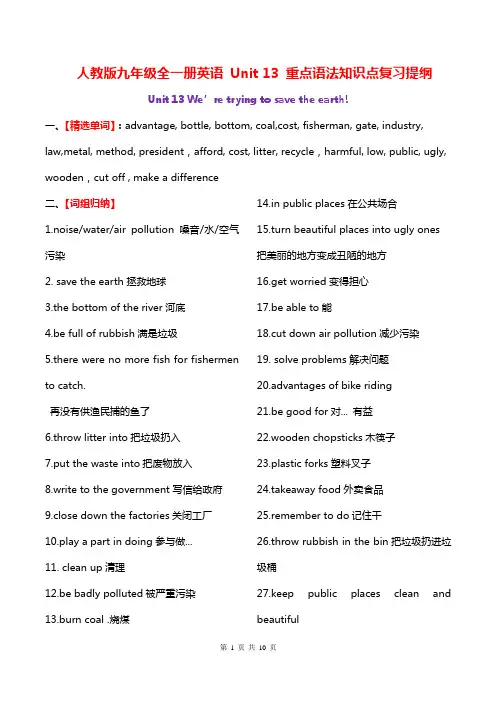
人教版九年级全一册英语Unit 13 重点语法知识点复习提纲Unit 13 We’re trying to save the earth!一、【精选单词】:advantage, bottle, bottom, coal,cost, fisherman, gate, industry, law,metal, method, president,afford, cost, litter, recycle,harmful, low, public, ugly, wooden,cut off , make a difference二、【词组归纳】1.noise/water/air pollution噪音/水/空气污染2. save the earth拯救地球3.the bottom of the river河底4.be full of rubbish满是垃圾5.there were no more fish for fishermen to catch.再没有供渔民捕的鱼了6.throw litter into把垃圾扔入7.put the waste into把废物放入8.write to the government写信给政府9.close down the factories关闭工厂10.play a part in doing参与做...11. clean up清理12.be badly polluted被严重污染13.burn coal .烧煤14.in public places在公共场合15.turn beautiful places into ugly ones 把美丽的地方变成丑陋的地方16.get worried变得担心17.be able to能18.cut down air pollution减少污染19. solve problems解决问题20.advantages of bike riding21.be good for对... 有益22.wooden chopsticks木筷子23.plastic forks塑料叉子24.takeaway food外卖食品25.remember to do记住干26.throw rubbish in the bin把垃圾扔进垃圾桶27.keep public places clean and beautiful保持公共场合干净漂亮28.make a difference to产生影响,有作用29.lead to a better future导致美好未来30.hear of听说31.a bowl of shark fin soup一碗鱼翅汤32.cut off their fins切下他们的鳍33.throw back into the ocean甩回到海洋34.not only...but also不仅...而且35. be harmful to对...有害36.at the top of the food chain在食物链的顶端37.in this industry在这一行当38.the number of ....的数目39.environmental protection groups .环境保护组织40.ask the government to develop laws 要求政府完善法律41.stop the sale of shark fins阻止鱼翅交易42.so far到目前为止43.scientific studies.科学研究44.be in danger处于危险中45.afford to do承担的起46. take action采取行动47.begin with从...开始48.take part in参加49.add up加起来,总计50.pay for为...付款51.recycle books and paper循环利用书籍和纸张52.turn off关闭e paper napkins用纸巾54.throw away扔掉,抛弃55.put sth to good use好好利用某物56.have a creative mind有一个创新思维57.a most unusual woman一个很不寻常的妇女58.build/make sth. herself out of rubbish 她自己用垃圾建造59.pull down拆下,摧毁60.turn upside down上下颠倒过来,倒转61.be made of由...做成62.an inspiration to sb. 对某人是个鼓舞63.be good at recycling擅长循环利用e sth. to do用某物去做什么65.set up a website .创建网站66.set up a small business开一家小公司67.sell them online网上卖他们68. plan to do计划做69.write a book about写一本关于...的书70.new ways to do sth. 干什么的新办法71.be known for因...出名72.make beautiful art pieces做漂亮的艺术品73.look like看起来像74.hope to do希望做75.a metal art theme park一个金属艺术主题公园76.the importance of .... 的重要性77. environmental protection环境保护78.bring happiness to others给别人带来幸福79.bring back to life使复活;使复生80. with a little creativity用一点创意81. not only ...but also不仅...而且82. get worse and worse变得越来越糟糕•三、【重点句式】:1.It used to be so clean.它过去是那么干净。
Unit 13 We are trying to save the earth.知识点及练习Section A知识点1. try v. 试图,努力,尝试用法:try to do sth. 尽力做某事try doing sth. 尝试做某事try one's best (to do sth.) = do one's best (to do sth.)尽某人最大的努力(做某事)短语:try on 试穿try out 试用,参加选拔have a try 尝试,试一下let me try 让我试一下2.the earth 地球,表示世界上独一无二的事物前面要加定冠词the。
短语:on the earth 在地球上on earth 究竟,到底3. pollution n.污染,污染物→pollute v. 污染→polluted adj.被污染的短语:air pollution 大气污染,空气污染noise pollution 噪音污染water pollution 水污染4. litter v. 扔垃圾n.垃圾= rubbish = trash短语:take out the rubbish 倒垃圾throw rubbish / litter 扔垃圾5. the bottom of……的底部the top of ……的顶部6. be full of = be filled with 充满……7. play a part 参与…;起作用play a part in “在…方面起作用;参与…”,后接名词、代词或动词-ing形式。
8.cut短语cut down 减少,把……砍倒cut in 插话cut off 切断;断绝cut up 切碎cut out 删除9. instead of 介词短语,后跟名词、代词或动词ing形式。
instead 副词,常位于句末。
位于句首时,其后有逗号。
10. It’s good for health and it doesn't cost anything! (P98)11.be good for 对……有益,反义词组be bad for。
Unit 13 We’re trying to save the earth!Section A1.现在完成时的用法(1)含义:表示过去的动作对现在构成结果或影响或者表示过去的状态一直持续到现在。
它强调与现在的联系。
(2)结构:have/has done(3)时间标志:already、yet、just、for+一段时间、since+过去时间点/一般过去时、ever、never、recently、lately、in recent years、so far、until now、up to now、before、次数、in/during/over the past/last+一段时间、以及固定句型This/That/It is+the+序数词+time+that从句(现在完成时)等。
eg:①The concert has started.(=The concert is on now.)②I have already seen the film.(=I know the film now.)③He has turned off the light.(=The light is off now.)(4)短暂性动词与延续性动词及其互换㈠短暂性动词口诀:来去到离看听说,买卖开关起跌落;参加开发还与借,变成带给使(死)完结。
㈡短暂性动词与延续性动词的互换come——be here,go——be there,leave——be away,open(v)——be open(adj),close(v)——be closed(adj),fall asleep——be asleep,join——be in,begin/start——be on,die——be dead,finish ——be over,buy——have,borrow——keep,become——be,catch a cold——have a cold.(注:有时候,短暂性动词的否定形式可表延续与时间段连用。
(完整版)人教版新目标九年级英语Unit13知识点及练习(word版可编辑修改)编辑整理:尊敬的读者朋友们:这里是精品文档编辑中心,本文档内容是由我和我的同事精心编辑整理后发布的,发布之前我们对文中内容进行仔细校对,但是难免会有疏漏的地方,但是任然希望((完整版)人教版新目标九年级英语Unit13知识点及练习(word版可编辑修改))的内容能够给您的工作和学习带来便利。
同时也真诚的希望收到您的建议和反馈,这将是我们进步的源泉,前进的动力。
本文可编辑可修改,如果觉得对您有帮助请收藏以便随时查阅,最后祝您生活愉快业绩进步,以下为(完整版)人教版新目标九年级英语Unit13知识点及练习(word版可编辑修改)的全部内容。
Unit 13 We are trying to save the earth。
知识点及练习Section A知识点1。
try v。
试图,努力,尝试用法:try to do sth。
尽力做某事try doing sth。
尝试做某事try one's best (to do sth。
) = do one’s best (to do sth.)尽某人最大的努力(做某事)短语:try on 试穿try out 试用,参加选拔have a try 尝试,试一下let me try 让我试一下2.the earth 地球,表示世界上独一无二的事物前面要加定冠词the。
短语:on the earth 在地球上on earth 究竟,到底3。
pollution n。
污染,污染物→pollute v。
污染→ polluted adj.被污染的短语:air pollution 大气污染,空气污染noise pollution 噪音污染water pollution 水污染4。
litter v. 扔垃圾 n。
垃圾= rubbish = trash短语:take out the rubbish 倒垃圾throw rubbish / litter 扔垃圾5。
Unit13 We’re trying to save the earth!Section A1. try to do =try one’s best to do 努力去做某事Every student should try to study hard in order to study in a university.为了进入大学学习,每个学生都应该努力学习。
2. be related to 与…有关I am not related to him in any way. 我和他无任何关系。
Everyone in this town should play a part in cleaning it up!3.play a part in在……方面起作用;参与某事A good diet plays a large part in helping people live longer健康的饮食在帮助人们长寿方面起着非常大的作用。
4. l itter rubbish garbage waste都可指垃圾不可数名词rubbish没用的东西(被扔或将要丢弃的无用的东西)不可回收litter (室内或公共场所)乱扔的废物(纸屑、不要的包装纸、废瓶等) 还可回收garbage 生活中的垃圾,包括厨房里的剩菜剩饭或者不能再用的食物Waste 任何被丢掉的东西Throw the rubbish out. 把垃圾扔出去。
The room is full of rubbish. 房间里堆满了垃圾。
Pick up your litter after a picnic. 野餐后将废弃物收拾好。
5.cut down 减少把...砍倒裁短缩减cut sb sth= cut sth for sb 为某人切某物cut sth into sth 把某物切成某物cut in 插话超车cut off 切断隔断断绝6. cost v. 花费;使付出指花费金钱,主语通常是物。
13 ’ !知识点总结词汇过关1. 乱扔n. 垃圾;废弃物2. n. 底部;最下部4. n. 煤;煤块5. 公众的;公共的n. 民众;百姓6. 丑陋的;难看的7. 优点;有利条件8. v. 花费n. 花费;价钱9. 木制的;木头的10. 塑料的n. 塑料;塑胶11. 有关系,作用,影响12. n. 鲨鱼13. n〔.鱼〕鳍14.〔短语〕割掉;砍掉15. n. 方法;措施16. . 残酷的;残忍的17. . 有害的18. n. 链子;链条19. n. 生态系统20〔.数量等〕减少的;低的;矮的21. n. 工业;行业22. n. 法律;法规23. .可重复使用的;可再次使用的24. v. 承当得起〔后果〕;买得起25. n. 运输业;交通运26. v. 回收利用;再利用27. n. 餐巾;餐巾纸28.(短语〕颠倒;倒转29. 大门30. 瓶;瓶子31. 负责人;主席;总统32. n. 灵感;鼓舞人心的人〔或事物33. 金属34. 创造力;独创性一.本单元语法复习:〔1〕现在进展时〔1〕含义:表示正在发生或进展的动作。
〔2〕根本构造:主语+ + 现在分词〔的形式随主语的变化而变化〕〔3〕根本用法:①表示现在正在进展的动作。
特征:常常及或具体的时间连用,有时句中会有感官动词来提示,或通过上下文来暗示。
②表示现阶段一直进展的动作。
这类动词常常是延续性动词。
常于, , 等连用。
③表示主语的特征、性格、能力等(2)现在完成时〔1〕含义:表示过去发生的动作对现在还有影响。
〔2〕根本构造:主语+ / + 过去分词〔3〕根本用法:①表示过去发生的动作,但强调对现在产生影响。
特征:不能及表示具体的时间状语连用。
②表示过去发生的动作或存在的状态一直延续到现在,还可能继续下去。
常常及, , + 时间名词,+时间名词等时间状语连用,而且谓语动词要求是延续性动词。
③表示一种“经历或体验〞,即可以表示经历过也可以是从来都没有经历过。
XX-XX学年度九年级英语Unit 13 知识点总结(新目标人教版)本资料为woRD文档,请点击下载地址下载全文下载地址九年级英语Unit13《we'retryingtosavetheearth!》知识点.现在进行时定义:表示说话时(瞬间)正在进行的动作,也表示目前或现阶段一直进行的动作。
结构:①肯定句:主语+am/is/are+V-ing②否定句:主语+am/is/are+not+V-ing③疑问句:Am/Is/Are+主语+V-ing用法:1)表示说话时正在进行的,目前正在发生的动作。
①Look!Thebigbirdisflyingaway.②Heiswatchingamovienow.2)表示目前一段时间内正在进行,但说话时可能没有进行的动作。
RightnowIamstudyingchinesebydistancelearning.我现在正通过远程教育学习汉语。
)2)常带有表示目前时刻的时间副词,如:now,rightnow,atthemoment,forthetimebeing,atpresent, thesedays及Look!Listen!...3)与always,constantly,forever,allthetime等副词连用,表示动作反复或习惯。
此时句子常含有说话者的强烈情感在内。
表达较强的“责备”或“表扬”之意①youarealwayschangingyourmind.你总是主意不定。
②Heisalwayshelpingothers.他总是帮助别人。
4)对于come,go,leave,arrive,start,fly,drive等表示位置移动的动词常可用进行时态表将来。
①Heisleavingonwednesday.②maryisn’thereatthemoment.Sheiscominglater.edtodo过去常常做某事见第四单元及use用法be/getusedtodoing习惯于做某事beusedtodo=beusedfordoing被用来做某事3.被动语态见第五单元注意:接双宾语的词的被动语态;make/let/havesbdo 的被动语态;see/hear/notice/find/observe/noticesbdo 的被动语态;It’ssaid/reported/believed/supposed/well-knownthat;及无被动语态的三种情况(感官动词、不及物动词、sell/write 等)4.现在完成时:用法:①过去发生的动作对现在造成的影响或结果:强调结果yesterdayIfinishedmyhomework,that’stosay,Ihavefinishedmyhomeworknow.②过去已经开始一直持续到现在的动作或状态:强调继续Ihavelivedheresince1990.现在完成时的构成have/has+过去分词现在完成时的四个基本句型肯定句Hehasfinishedthework.一般疑问句Hashefinishedthework?否定句Hehasnotfinishedthework.两回答yes,hehas.No,hehasn’t.特殊疑问句whathashedone?在下列情形下用现在完成时九词语①already已经肯定句中或句尾Ihavealreadyfoundmypen.=Ihavefoundmypenalready.②yet已经否定句和疑问句句尾Ihavenotfinishedtheworkyet.Haveyouboughtacomputeryet?③ever曾经句中Haveyoueverseenpandas?④never从不句中IhaveneverbeentoBeijing.⑤just刚刚句中Ihavejustdonemywork.⑥before以前句尾Ihaveneverbeentherebefore.⑦sofar到目前为止Sofarhehaslearned200words.⑧howlong多久Howlonghaveyoulivedhere?⑨howmanytimes多少次HowmanytimeshashebeentoBeijing?2两词组have<has>goneto去了某地例:HehasgonetoBeijinghave<has>beento去过某地例:HehasbeentoBeijing.3两结构fortwomonthsfor+一段时间jimhaslivedherefor2months.sincelastyearsince+过去时间点LucyhasbeeninBeijingsince3yearsago.since3yearsagosince1990sincehecameheresince+过去时态句子Hehasbeeninchinasincehecamehere.4如果句子里面没有时间状语,汉语意思能够加“已经”,往往用现在完成时态。
Unit 13 W e’re trying to save the earth!知识点总结词汇过关1.v. 乱扔n. 垃圾;废弃物2. n. 底部;最下部4. n. 煤;煤块5.adj. 公众的;公共的n. 民众;百姓6.adj. 丑陋的;难看的7.n. 优点;有利条件8. v. 花费n. 花费;价钱9.adj. 木制的;木头的10.adj. 塑料的n. 塑料;塑胶11. 有关系,作用,影响12. n. 鲨鱼13. n(.鱼)鳍14.(短语)割掉;砍掉15. n. 方法;措施16. adj. 残酷的;残忍的17. adj. 有害的18. n. 链子;链条19. n. 生态系统20.adj(.数量等)减少的;低的;矮的21. n. 工业;行业22. n. 法律;法规23. adj.可重复使用的;可再次使用的24. v. 承担得起(后果);买得起25. n. 运输业;交通运26. v. 回收利用;再利用27. n. 餐巾;餐巾纸28.(短语)颠倒;倒转29.n. 大门30.n. 瓶;瓶子31.n. 负责人;主席;总统32. n. 灵感;鼓舞人心的人(或事物33.n. 金属34.n. 创造力;独创性一.本单元语法复习:(1)现在进行时(1)含义:表示正在发生或进行的动作。
(2)基本结构:主语+ be + 现在分词(be 的形式随主语的变化而变化)(3)基本用法:①表示现在正在进行的动作。
特征:常常与now或具体的时间连用,有时句中会有感官动词来提示,或通过上下文来暗示。
②表示现阶段一直进行的动作。
这类动词常常是延续性动词。
常于at present, this week, these days等连用。
③表示主语的特征、性格、能力等(2)现在完成时(1)含义:表示过去发生的动作对现在还有影响。
(2)基本结构:主语+ have / has + 过去分词(3)基本用法:①表示过去发生的动作,但强调对现在产生影响。
特征:不能与表示具体的时间状语连用。
②表示过去发生的动作或存在的状态一直延续到现在,还可能继续下去。
常常与since, for, in the past + 时间名词,in the last +时间名词等时间状语连用,而且谓语动词要求是延续性动词。
③表示一种“经历或体验”,即可以表示经历过也可以是从来都没有经历过。
(3)被动语态归纳如下(三种红色要求熟练掌握,其余为了解)(1)一般现在时是被动语态:am / is / are + 过去分词(2)现在完成时的被动式:have / has + been + 过去分词(3)现在进行时的被动式:am/ is/ are + being + 过去分词(4)一般过去时的被动式:was / were + 过去分词(5)过去进行时的被动式:was / were + being + 过去分词(6)过去完成时的被动式:had + been + 过去分词(7)一般将来时的被动式:will / be going to be+ 过去分词(8)含有情态动词的被动式:情态动词+be +动词的过去分词。
(4)情态动词情态动词表示说话人对某一动作或状态的态度,如认为“可能”、“应当”、“必要”等。
情态动词本身有一定的意义,但不能单独作谓语,也没有人称和数的变化。
后面一般跟动词原形。
(5)used to 结构used to意为“过去常常做某事”,指的是过去的习惯性动作,目的在于与现在形成对照。
used to是个情态动词,其中的to是不定式符号,后面跟动词原形。
在美式英语中。
它的疑问式是:Did +主语+use to do sth.?否定式是:主语+didn't use..。
二、重点词汇1. 词义辨析:cost/spend/take/pay 都与“花费”有关,但用法上有区别。
I turned around to see who was calling me.我转过身看谁在喊我。
Please turn to Page 10. 请翻到第十页。
I have turned into a woman with strong will. 我已经变成了意志坚定的人。
She turned over and fell to sleep.她翻了翻身,睡着了。
turn 还可作名词,意为“机会,轮次”4.afford to do sth.:买得起……,足够支付…… (affordable. adj.买得起的)We can’t afford to pay such a high price.我们付不起这个价钱。
5. be harmful to:对……有害 =be bad forStaying up often is harmful to your health.经常熬夜对你的健康有害。
拓展:1. harm:n. 害处 2. do harm to:对……有害6. at the top of:在……顶端There was not enough oxygen at the top of the mountain.山顶上缺氧。
He shouted at the top of his voice in order to be heard.他尽力大声叫喊,以便别人能听见。
拓展:反义词at the bottom of:在……的底端7. take action:采取行动The police had to take action to deal with the riots. 警方不得不采取行动来对付骚乱。
8. throw away:扔掉;错过(机会等)Many people throw away cigarette ends carelessly. 许多人随手乱扔香烟头。
Don’t throw away this opportunity.别错失这次机会。
拓展: 1. throw at:扔向… 2. throw about:到处扔9. put sth. to good use:好好利用某物 =take the advantage of sthIf you focus your mind on the task, your talents can be put to good use.如果你集中精神在工作上,你的才能就能好好利用起来。
10.pull…down:拆毁pull together_________________They are going to pull down the old building and replace it with a new shopping mall.他们打算把这幢旧建筑拆掉,并代之以新的商场。
11.upside down:上下颠倒The lid, turned upside down, served as a coffee table. 那个盖子被反过来当作咖啡桌。
12. bring back:归还;使想起Your article brought back sad memories for me. 你的文章使我想起了伤心的往事。
拓展:1. bring up:抚养长大 2. bring in:引进 3. bring forward:提出 4. bring about:带来,造成13.一词多义:work n.工作;(音乐、艺术)作品;工厂 v. 工作He has much work to do.他有很多工作要做。
(做“工作”讲,为不可数名词)The man gained his wealth by printing works of famous writers.他通过印刷著名作家的作品来获得财富。
(做“作品”讲,为可数名词,但常用复数)The glass works is/are near the station.玻璃厂在车站附近。
(做“工厂”讲,只用复数形式,但谓语动词单复均可)拓展:英语中有些名词,单复数形式意义有差别。
manner 方式,方法manners 礼貌,礼仪 arm 胳膊 arms 武器water 水 waters 海水,水域wood 木头 woods 森林mean意思是means手段,方法14. 辨析:need to be done; need doing与need to do⑴need doing=need to be done "需要被…"现在分词doing表被动“需要被做”,相当于need to be done。
My watch needs repairing. =My watch needs to be repaired.我的表需要修了。
⑵need后加不定式,证明need为实义动词,而非情态动词,这时need有人称和数的变化。
He needs to get up early. 他需要早起三、重点句型Other advantages of bike riding are that it’s good for health and it doesn’t cost anything.解析:本句的主干是Other advantages of bike riding are…;that it’s good for health…anything 是由that 引导的表语从句;其中it’s good for health 和it doesn’t cost anything 是骑自行车的两个优势。
翻译:骑自行车的其它好处有:有益健康而且不花钱。
But do you realize that you’re killing a whole shark each time you enjoy a bowl of shark’s fin soup? 解析:本句的主干是do you realize…?;that you’re killing a whole shark 是realize 的宾语从句;each time you enjoy a bowl of shark’s fin soup 是时间状语从句。
翻译:但是你有没有意识到每次你喝鱼翅汤的时候其实是在杀害一整头鲸鱼?出题建议:确定好题型后,在关键词中输入:each time。
Many believe that sharks can never be endangered because they are the strongest in their food chain. 解析:本句的主干是Many believe…;that sharks can never be endangered 是believe 的宾语从句;because they are the strongest in their food chain 是由because 引导的原因状语从句。